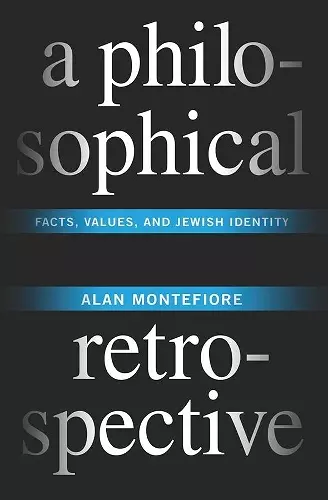A Philosophical Retrospective
Facts, Values, and Jewish Identity
Format:Hardback
Publisher:Columbia University Press
Published:26th Apr '11
Currently unavailable, and unfortunately no date known when it will be back

An Oxford University scholar reflects on his efforts to come to a better understanding of the conflicts bound up with personal identity.
As a young lecturer in philosophy and the eldest son of a prominent Jewish family, Alan Montefiore faced two very different understandings of his identity: the more traditional view that an identity such as his carried with it, as a matter of given fact, certain duties and obligations, and an opposing view, emphasized by his studies in philosophy, according to which there can be no rationally compelling move from statements of fact--whatever the alleged facts may be--to "judgments of value." According to this second view, individuals must in the end take responsibility for determining their own values and obligations. In this book, Montefiore looks back on his attempts to understand the nature of this conflict and the misunderstandings it may engender. In the process, he illustrates through personal experience the practical implications of a characteristically philosophical issue. Montefiore finally settles on the following: while everyone has to accept that facts, including those of their own situation, are whatever they may be, both the "traditional" assumption that individuals must recognize certain values and obligations as rooted in those very facts, and the contrary view that individuals are ultimately responsible for determining their own values, are deeply embedded in differing conceptions of society and its relation to its members. Montefiore then examines the misunderstandings between those for whom identity constitutes in effect a conceptual bridge connecting the facts of who and what a person may be to the value commitments incumbent upon them, and those for whom the very idea of such a bridge can be nothing but a confusion. Using key examples from the notoriously vexed case of Jewish identity and from his own encounters with its conflicting meanings and implications, Montefiore depicts the practical significance of the differences between these worldviews, particularly for those who hove to negotiate them.
Alan Montefiore, who taught and influenced some of the most prominent philosophers writing today, was among the first to have realized that so-called 'analytic' and 'continental' philosophy are merely two dramatically different idioms in which the same issues get discussed, at their best, in depth and with rigor. This book on identity brings to bear his subtle and longstanding philosophical preoccupation with the fact-value distinction on his lifelong individual and intellectual struggle with the question of Jewish identity. Its conclusions will no doubt be considered controversial by some. Yet even those who do will find the form in which they are presented to be an appealing mix of detached analysis and genuine feeling rare in current philosophy. -- Akeel Bilgrami, Columbia University Alan Montefiore has been thinking about issues concerning morality and identity for a long time. You could say that academic fashion has now caught up with him. What is more, several of those who have brought these questions to the fore are his long-time friends and conversation partners. I am thinking, in particular, of Bernard Williams, Alasdair MacIntyre, and Charles Taylor, not to mention Jacques Derrida. So what Montefiore says about these thinkers' ideas has the extra interest of emerging from personal engagement. For all of these reasons, this is a welcome book. -- Michael Rosen, Kennedy School of Government A Philosophical Retrospective offers an illuminating exploration of the complexities and ambiguities of the modern notion of identity, so central to today's politics. Alan Montefiore examines this notion against two radically different backgrounds: the fundamental philosophical issue of the relation to facts and values, and the highly particular features of his own situation as a contemporary Jew. His book demonstrates the depth and resonance that this dual background can give to the discussion. It is exemplary of what philosophy can do (but rarely does): relating the viscerally felt dilemmas of life to the most universal issues of thought. -- Charles Taylor, author of A Secular Age offers fresh insight to patient readers seeking to understand their place in the world as individuals and members of multiple communities, as long as they enjoy the journey and do not fret about reaching the destination. Choice ...learned, provocative, and insightful... -- Mitchell Silver H-Judaic
ISBN: 9780231153003
Dimensions: unknown
Weight: unknown
216 pages